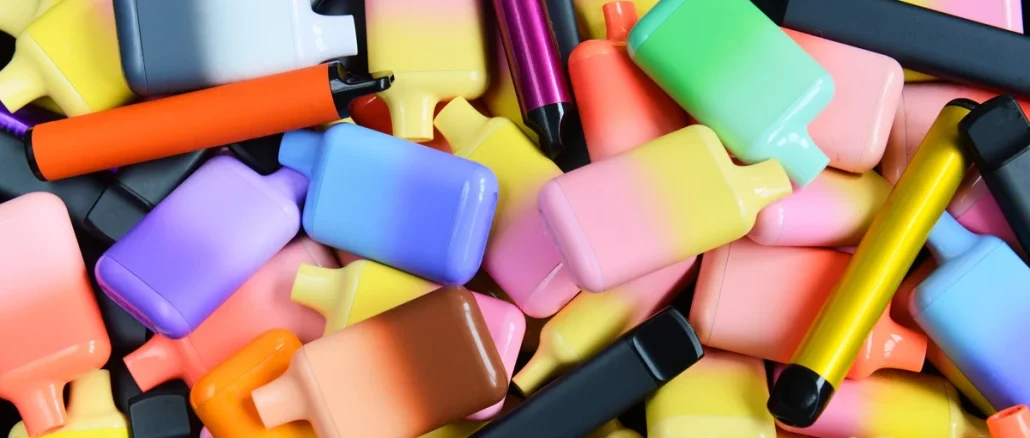
In September 2024 the cabinet agreed to ban the sale of disposable vapes, as well as a reduction of flavours available on the Irish market. It’s quite a straightforward move to make as a government, especially when it comes to the health of young people and the environment. However, I do have one major issue with it.
VBI (Vaping Business Ireland) spoke about the new legislation and called it an “extreme” move. Some arguments that the trade organisation brought up were quite valid, as they expressed concerns about quitters returning to smoking, or consumers moving towards the black market. I will address this later. However, one argument that is shy of VBI’s arguments is the environmental impact that disposable vapes have.
The title alone pretty much says everything I’m going to say. Disposable vapes are disposable – another fancy term for saying that they’re “gonna end up in landfills”. Several academic studies indicate that disposable vapes have only a harmful effect on our environment, they’re difficult to take apart, and therefore will be difficult to dispose of correctly. Single-use plastics have been proven time and time again to be harmful, to both our land and sea. Harmful chemicals that are used in disposable vapes such as battery acid, lithium, and nicotine can spill into our environment, destroying the biodiversity of our earth. In the UK, it was reported that 1.3 million vapes are thrown away each week. In one year, that would be enough vapes to fill 22 football pitches. In the little debate on the ban on disposable vapes, the question of the environment tends to be left to the wayside. I think the reason for this is because of the other growing problem that disposable vapes bring.
When vapes initially came onto the market, they were branded as “e-cigarettes”. A brand new, healthy alternative to regular smoking. This is the outlook that Vaping Business Ireland still puts forward today when tackling any sort of criticism of vaping. They primarily see it as a tool for smokers to quit smoking. However, the impact it has on young people far outweighs the benefits that vaping provides to the diminishing smoking population.
Due to the lack of research on the long-term effects of vaping and the availability of medicines to stop smoking, the HSE does not recommend vaping as an alternative way to stop smoking. Unlike stop-smoking medicines, vapes are not licensed medicines and have not gone through as much testing and regulation, which stop-smoking medicines have.
With that said, medical research seems to be quite mixed in terms of the general population. Due to its short life on the market, there has been little evidence found, regarding the long-term effects caused by vaping. A lot of research is based on the direct cause of the components of vapes, rather than the vapes themselves. The aerosols used in vapes are known to increase the risk of cardiovascular diseases, lung disorders, and issues during pregnancy. Any positive research relating to vaping primarily comes from those moving from cigarettes to vaping, supporting VBI’s outlook. However, as previously said HSE does not recommend this.
The majority of health issues related to vaping have been found predominantly in children and people under the age of 25. There have been mixed percentages in terms of the number of people under 25 who vape. Most current figures suggest that “11% of under 25s vape”, “37% of 16-year-olds have tried vapes” and much, much more. To be honest, it’s almost impossible to find an exact number of people who vape, mainly because the demographic studied is full of people who don’t like to admit that they vape. Either out of fear that they’ll get caught, out of shame or maybe they don’t think they vape enough to be considered as someone who uses a vape. I find these numbers to be quite low and I expected the actual figure to be much higher, as it’s impossible to go throughout the day without seeing a vape in someone’s hand and smelling a cloud of salted caramel, watermelon…or whatever flavour of the day it is.
Regardless of the flavour you use, vaping causes harm. Disposable vapes have been found to cause developmental effects in the brain. When a child, teen, or young adult vapes, it can lead to mood disorders, nicotine addiction, and a decrease in impulse control. When a child, teen, or young adult begins vaping, it makes them more susceptible to other addictions by building new neural pathways in the brain. This means young people who vape are more likely to start smoking than those who do not vape. This brings me back to the points that VBI makes, making disposable vapes illegal will leave many vulnerable without their fix and therefore may turn to vape “dealers” in the black market. Unregulated products could have an unregulated amount of nicotine inside them and perhaps open them up to a whole other world of drugs.
I do not believe Ireland has the legal and medical structure to properly respond to this possible surge of addiction we could get within the next few months or years from the disposable vape ban. For many people, vapes are used as a comfort, and with damaging comfort, it can cause addiction.
The ban on disposable vapes is needed and is welcome with open arms. However, it may be too late for the thousands of young people around the country. Now, after months of building the neural pathways to addiction, avid vapers will become vulnerable to their dependencies and will likely end up depending on cigarettes or many other harmful drugs. This ban holds a mirror up to Ireland’s infrastructure when it comes to dealing with addiction. I believe it requires a major rework. Its faults can be seen on the streets, the faces of citizens who now live on those streets and it can be seen in our hospital beds.
I’m aware this article has come off as quite hopeless. However, there have been attempts all around the world to tackle the issue of addiction. In 2000, Portugal had a massive epidemic of drugs. The problem got so bad that 1% of the entire Portuguese population were addicted to meth. Today, that number has reduced drastically. Want to know why? Instead of isolating addicts and promoting shame, giving them criminal records, and punishing them from all angles, they gave them something to help them get up in the morning, something for addicts to look forward to. The Portuguese government offered to pay half the wages of every addict working in the economy. They realised that addiction is an illness, but not a terminal one.
Currently, Ireland criminalises anyone caught with drugs, taking away the ability to ever work again. If Ireland could adopt some of Portugal’s approach to addiction, maybe the country would look a lot different. Maybe that’s something to consider for the general election coming up soon. Maybe our new government will be a little more forward-thinking when it comes to that.



